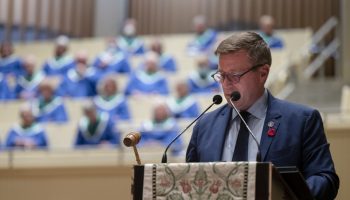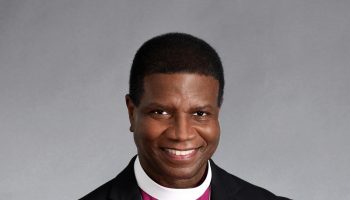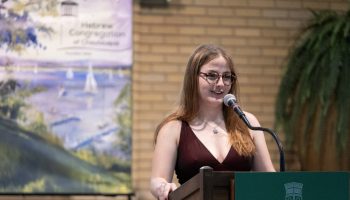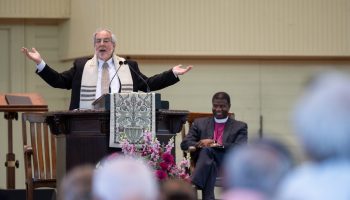“Oh Chautauqua, my heart is breaking for the five police officers in Dallas, for Alton Sterling and Philando Castile and the four more who did it. God help us, God help us all,” said the Rev. Barbara Brown Taylor at the beginning of her sermon on at the 9:15 a.m. Friday morning worship service.
Her title was “The Politics of Opposition” and the Scripture was Luke 13:31-35.
“I hope what you heard was better than what was said. At Chautauqua, our defenses are lower here and we can challenge and enjoy each other,” she said. “That is the miracle of community.”
Having talked about money all week, she focused on power for her final sermon.
Our fears get cranked up when power is changing hands.
“We know how it works. I see you as the enemy and tell people how you should be destroyed. Then I go after the supporters of my enemy and demean their values,” she said. “Where is the brake pedal between rhetoric and real violence? Why does this endure? Because it feels so good to be right.”
Jesus is the worst possible savior for those who love to hate their enemies. When friendly Pharisees came to tell him to get out of Jerusalem, Jesus stood undefended before them.
“That was his favorite way to stand. He kept seeing Jerusalem as a city full of scattered chicks in need,” she said. “‘How often have I desired to gather your children together as a hen gathers her brood under her wings, and you are not willing!’”
The Bible, she noted, does not record any killing of a single prophet in Jerusalem except John the Baptist and Jesus. Calling Herod a fox was the worst that Jesus could say about him and “we can’t get through an election without hanging targets on people,” Taylor said.
The Northeast Georgian, Taylor’s hometown newspaper, is published twice a week and is filled with news about development funds for a local theater or the valentines school children made for people who receive Meals on Wheels.
“It is a fair reflection of a small town but the letters to the editor are full of snark and innuendo. Who are these people?” she said.
She used to try to identify the writers but stopped when she realized she was succumbing to the “us or them” rhetoric in the letters.
“We have no illusion that things will change. The government is broken and Washington is a toxic dump,” she said. “Washington, the city that neuters its visionaries and throws stones at those sent to heal it.”
Jesus cannot fix Washington or Jerusalem but has a word for us. Taylor talked about the dialogue between President Barack Obama and writer Marilynne Robinson, author of Gilead. She described it as a conversation about American culture and citizenship. After talking about Gilead, they discussed her non-fiction, particularly the role fear is playing in our democracy, politics and culture. Robinson said her thesis is contemporary America is full of fear and that fear is not a Christian habit of mind.
Taylor said if you take the word Christian out of the statement, that is the basis of our democracy: the willingness to think well of others. People basically want to do well, but conspiracy theories have brought fear home and elevated it to levels that are dangerous for democracy.
She cited some examples of those fears from her local newspaper: the fear of those who don’t speak English or who speak it with an accent; the gap between the decency of my views and the indecency of the opposition; support for demonizing those who don’t agree with us; and the ease to think that others want the wrong thing.
Robinson, Taylor said, said people believe the worst thing they can say about someone is the truest thing they can say. Taylor said calling someone a fox, like Jesus did Herod, was not the worst thing he could say about his foes.
Taylor used to read the text as a lament for the people who would not hear the words of their savior, but today she heard it as a lament that we won’t be gathered together.
“When the fox appears, the chicks don’t check out who is next to them or what brood they are from,” she said. “They run for cover.”
She said Robinson believed if we turned off the media for a week, we could return to a normal anthropology. We could have a society with civil debate, a meaningful vote and even if you lost, there would be a presumption of goodness on both sides.
“What is most at stake is our ability to gather together,” Taylor said. “You give me hope, Chautauqua, that we have another way to teach and embody. You seed all kinds of communities because when the defenses come down, you can still see the goodness in others and fear has a hard time getting someone to talk [to it].”
After the shootings at Emanuel African Methodist Episcopal Church in Charleston, South Carolina, a young white man visited a Bible study at another AME church. He scared the members of the group. The pastor, Rev. Black, said after the shootings, the doors to AME churches were going to be open, and if they were open on Sunday, they would be open on Wednesday night. The young man was welcomed, still attends and the doors remain open.
Taylor quoted the Rev. Betty Clark, the new pastor of Mother Emmanuel, who said, “We have to learn to love the hell out of other people.”
“This is how miracles happen. They shelter others, aware of the risks,” Taylor said. “This is their favorite way to stand.”
The Rev. Luke Fodor presided. Celia Knighton, resident advisor for the scholarship students of the International Order of the King’s Daughters and Sons, read the Scripture. The Motet Choir sang “The Image of God” by Craig Courtney with lyrics by Susan Bentall Boersma. Barbara Hois provided flute accompaniment. Jared Jacobsen, organist and coordinator of worship and sacred music, directed the choir. The Jackson-Carnahan Memorial Chaplaincy provided support for this week’s services.





